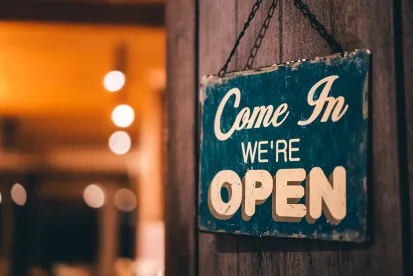Last updated December 31, 2020
These restrictions are changing rapidly – please check back regularly for updates, or refer to state websites
In response to the COVID-19 pandemic and its threat to public health from in-person contact, every state in New England issued orders closing or otherwise limiting business operations. Over the past few months, almost all states in the region have begun scaling back or reversing their phased reopenings due to the spiking COVID infection rates. Additionally, almost every state in the area has instituted mandatory closure times (curfews) for businesses. A summary of the current key orders and plans is outlined below. Our alert regarding travel restrictions and quarantine requirements throughout New England is available here.
We note specifically that the regional suspension of interstate youth hockey (between all states in New England and New Jersey) has been extended through January 31, 2021.
Please note that some localities, primarily in urban centers, have more restrictive requirements than those issued by the state, particularly in Massachusetts.
Please note that orders are often extended only shortly before they are set to expire.
|
CT |
ME |
MA |
NH |
RI |
VT |
|
|
State of Emergency Declared |
March 10 |
March 15 |
March 10 |
March 13 |
March 9 |
March 13 |
|
State of Emergency Duration |
||||||
|
Price control order in effect |
N/Aβ |
|||||
|
Early Business Closure |
10:00 pm |
9:00 pm |
9:30 pm |
N/A |
10:00 pm weekdays, 10:30 pm weekends |
10:00 pm |
|
Cross-border travel restriction† |
10-day quarantine or negative test |
10-day quarantine or testing |
10-day quarantine or negative test |
10 day quarantine or negative test |
14-day quarantine or negative test |
14-day quarantine, or 7-day and negative test |
|
Masks or coverings in public* |
||||||
|
Essential services list |
||||||
| Penalties for non-compliance | $100 for masks; $250 for attending gatherings, $10,000 for hosting nonresidential gatherings | $1,000 for individuals; up to $10,000 for businesses | Up to $300 for masks and workplace violation; $500 for each person over gathering limit | $1,000 for reckless violation; $2,000 for failure to comply w order; $1,000 for | $100 for first offense; $250 for second; $500 for third | Up to $1,000 per violation |
β relief available under state’s consumer protection laws
† see our alert on travel restrictions for additional requirements and exemptions
* where other physical distancing measures are difficult to maintain
Connecticut
Connecticut is currently in Phase 2.1 of its re-opening, a rollback from Phase 3 based on an increase in cases state-wide. Order 9K made the following changes to gatherings:
- Religious gatherings: indoors at 50% capacity, capped at 100 people, with masks and social distancing; outdoors limited to the number of people that can be accommodated safely by the venue, masks and social distancing required
- Graduations: indoors at 50% capacity, capped at 100 people, with masks and social distancing; outdoor 50% capacity with no cap, masks and social distancing required
The order also returned to state-wide protective measures, repealing the authority for municipalities to revert back to pre-Phase 3 gathering and capacity limits for certain types of businesses in instances of increased COVID-19 spread within the community. Also under the order, rules pursuant to Order 7MM easing the ability to expand outdoor dining were extended through February 9, 2021. In addition to a mandatory 10:00pm closing time for restaurants (takeout and delivery may continue past this time), entertainment and recreation venues, and indoor and outdoor events at commercial venues, the following capacity restrictions for Phase 2.1 are also in place:
- Restaurants: up to 50% capacity indoors with 6 feet of spacing and maximum of 8 people per table; service of alcohol not permitted unless the patron is seated at a table of bar and is consuming food prepared on the premises; see guidance for requirements for tent structures used for outdoor dining
- Outdoor event venues (e.g. amphitheaters, race tracks, etc.): capacity up to 25%, with masks and social distancing requirements; cap of 50 people for outdoor private event at a commercial venue
- Indoor performing arts venues: open at 50% capacity, capped at 100 people, with masks and social distancing requirements, only seated audiences allowed, and no service of food or beverages
- Indoor recreation (incl. bowling and movie theaters): up to 50% capacity, capped at 100 people
- Private social and recreational activities: indoor at commercial / business establishments can operate at 50% capacity, capped at 25 people (outdoor capped at 50 people); at private residence capped at 10 people for both indoor and outdoor. Guidance for indoor events excludes back-of-house staff from the 100 person indoor event limit
- Bars and nightclubs continue to remain closed
Effective November 23, the state put a pause on all team sports, except collegiate and professional, through January 19, 2021. During this time, participation in all high risk sports is prohibited, as are scrimmages, competitions, camps, and tournaments. Athletes also may not participate in any out-of-state team practices, clinics, or tournaments, and those from out of state may not attend the same in Connecticut. Connecticut, along with all other states in New England and New Jersey extended the regional suspension of interstate youth hockey competitions through January 31, 2021. Within the state, hockey is subject to general rules for sports and fitness facilities. Gyms and fitness centers that do not provide organized sports are limited to 50% capacity, while smaller studios offering only group classes are limited to 25%.
Order 9B, effective September 15, authorizes local officials, including state and municipal police officers and public safety departments of high education institutions to issue fines for certain violations of COVID-related orders and regulations, including a $100 fine for violations of the mask requirements pursuant to Order 7NNN and other sector rules and a $250 fine for persons who attend gatherings in violation of size restrictions. Order 9N outlines additional enforcement authority regarding violations of size and capacity restrictions, modifying previous orders on the same subject. Effective November 26, owners or those in control of nonresidential properties who violate size or capacity limitations are subject to a civil penalty of $10,000 per violation. Private gatherings in homes and religious and worship gatherings remain subject to sector-specific guidance but are generally not be subject to the penalty. The order states further that the Commissioner of Public Health may take additional measures to ensure enforcement.
Guidance for the upcoming holiday season is available here. Guidance has also been revised for Phase 2.1 for the following businesses: amusement parks and hotels and lodging, libraries, film, television, and digital media production, and personal services, including nail salons, spas, and tattoo parlors (in addition to hair salons).
Order 9L clarifies that any COVID-related order currently in effect is extended through February 9, 2021 except that individual sections of an order that call for expiration on a specific date will remain in effect until that date.
Social clubs must follow all rules applicable to the specific operation, such as restaurants and pools. Phase 2.1 guidance is also available for offices, museums, zoos, and aquariums, and retail & malls, and the essential business rules from Order 7PP are extended through the duration of the emergency unless otherwise modified. Guidance on the essential businesses rules is available here, and here for essential retailers. General business rules applicable to university research and outdoor recreation activities, are available here. The “safe workplaces” guidance (Order 7V) for essential businesses remains in effect unless a business is otherwise subject to sector-specific rules.
Trails and state parks also remain open, as well as state campgrounds. Childcare facilities are limited to a group size to 16 or 18 children depending on space, although limited to 8 for infants and toddlers. All staff and children over the age of three are required to wear masks. Guidance for nursing homes and senior centers is also available.
Please refer to our alert on updated travel requirements for quarantine and travel guidance. Connecticut’s state of emergency and price controls for designated goods are currently in effect through February 9, 2021.
Maine
On December 30, Governor Janet Mills announced that she was again extending the requirement for certain businesses to close by 9:00pm. The curfew, which applies to all outdoor and indoor amusement venues, movie theaters, drive in theaters, performing arts venues, casinos, and businesses that provide seated food and drink service, including social clubs, restaurants, and bars and tasting rooms currently open for outdoor service is now in effect until further notice. 2021. Businesses subject to the curfew must close for the night by 9:00 pm and remain closed until their scheduled reopening time the following day. Note that restaurants and other seated food service businesses may continue delivery and takeout after 9:00 pm. Our alert on these new measures is available here.
On November 23, Maine’s Attorney General and Department of Health and Human Services issued joint guidance to businesses regarding enforcement, particularly with respect to mask wearing, and potential consequences of noncompliance. Of particular note is that individuals can be charged criminally for not wearing a face covering in a public setting after being warned by a law enforcement officer to do so. Generally, noncompliance with the governor’s executive orders can be a Class E crime punishable by up to 180 days in jail and a $1,000 fine for individuals and up to $10,000 for businesses.
Order 19A simplifies and strengthens enforcement of the face covering requirement, reiterating that owners and operators of indoor public settings must require all persons to wear face coverings in publicly accessible areas. Exceptions remain in place for those under 2 years of age, but makes clear that, due to the threat to public health and safety, while reasonable accommodations are available for those with disabilities, those accommodations cannot permit any person to enter or remain in an indoor public setting without a face covering (so, accommodations will likely need to be in the form of curbside pickup or other outdoor alternatives rather than waiving the mask requirement). Order 16, which requires a face covering in any public setting regardless of the ability to maintain physical distance, remains in place, although any contrary language from that and previous mask-related orders is repealed by Order 19. Answers to commonly asked questions regarding the mask mandate are available here.
Additionally, effective November 4, indoor gatherings went back to a maximum of 50 people, regardless of building capacity, while outdoor capacity limits remain at 100 people. Guidance for large gatherings generally is available here. Occupancy limits for retail establishments will remain at 5 people per 1,000 square feet of shopping space. This replaces the previous cap of 100 people for Phase 4 under Order 14. The previously-expected November 2 reopening of bars and tasting rooms for indoor service has been postponed until further notice.
Updated guidance is in place for the following businesses:
- Retail businesses, gyms and fitness centers, and museums
- Restaurants: maximum of 50 persons seated inside and 100 outside, including front-of-house staff, with total occupancy (indoor and outdoor) not to exceed 150 people
- Religious services: staff required to wear face cloth coverings
- Personal services, including spa/close-contact, tanning, tattoo and piercing, barber shops and hair salons, and nail salons
- Short-term rentals and lodging: in accordance with quarantine guidelines per Order 54 and the Keep Maine Healthy plan)
- Outdoor recreation, including campgrounds and coastal state parks
- Community sports: participation allowed based on risk level of sport or activity and level of play (aside from youth hockey, given Maine’s participation in the regional suspension for interstate play through January 31, 2021); note that professional and collegiate sports and events have separate guidelines
Maine has also issued guidance for businesses with seasonal activities such as craft fairs, and sleigh rides. Otherwise still in place is the guidance from Phase 2 via Order 55. All essential businesses and businesses that opened in Phase 1 remain open, including offices for those in legal and professional fields.
Construction firms must reduce the size of work crews and stagger shifts to minimize interaction between teams. Guidance for in-home services, including electricians, plumbers, cleaners, and installers, is available here. With appropriate safety precautions, including maintenance of six feet of physical distance and the wearing of masks where such distance cannot be maintained, the following businesses are also allowed to open:
- Health care services
- Pet grooming
- Real estate, auto dealerships and car washes
- Outdoor recreation, such as guided outdoor activities, and golf and disc golf courses
- State parks, state-owned public land trails, and historic sites
Please refer to our alert on travel requirements for quarantine and travel guidance. Maine’s state of emergency and price controls are currently in effect through January 20, 2021.
Massachusetts
Effective December 26, Order 59 adjusted capacity limitations (from Orders 57 and 58) state-wide as follows:
- Continues limit of 10 people for indoor gatherings and events, and 25 for outdoor gatherings and events
- Restaurants: limited to 25% capacity, excluding workers and staff; capacity for indoor and outdoor areas counted separately
- Theaters and performance venues: indoor venues remain closed; movie theaters limited to 25% capacity up to 50 people, outdoor venues at 25% capacity up to 25 people
The following businesses will also be limited to 25% capacity, regardless of prior or current sector-specific protocols: close contact personal services, casinos, office spaces, places of worship, retail, indoor golf facilities, libraries, common areas of lodging facilities, arcades, fitness and health clubs, museums and cultural facilities, and any other sector not addressed. A quick-review of the capacity and gathering limits is available here.
Per Order 57, these limitations apply to all social, community, civic, public, and leisure events, as well as conferences, conventions, fundraisers, and other similar events. All such venues and events must comply with the gathering limitations in the order and the relevant sector-specific guidance. The gathering restrictions do not apply to federal government entities, health care facilities, or workplaces or facilities with specialized functions such as public and private schools, residential and day schools for special needs students, or Department of Correction facilities. Notably, workers and staff on-site to provide services to participants in these gatherings do not count toward the capacity limitations. Gatherings for religious activities and outdoor gatherings for political expression are also exempt, but indoor gatherings for either must follow applicable sector-specific capacity limitations.
In addition to the state-wide rollbacks, a number of communities in Massachusetts, including Boston, Brockton, Lynn, Newton, and Somerville, have reimposed or implemented new restrictions to further combat COVID spread in those areas. Although Governor Baker’s COVID-related orders had previously expressly prohibited municipalities from implementing more restrictive guidance on closures, the Governor recently issued a statement supporting local officials’ implementation of restrictions to slow the spread of COVID-19 as necessary for their communities.
For example, Boston reverted back to a modified Phase 2 Step 2 effective December 16 via order of supplemental restrictions, with the following limits in place:
- Limit of 10 people for indoor gatherings and events, and 25 for outdoor gatherings and events; applies to private and public gatherings but not to gatherings for religious activities or outdoor gatherings for political expression
- Restaurants: 90 minute limit per table; no bar seating unless approved by Boston Licensing Board; no live entertainment; no ancillary activities such as pool tables, trivia, or darts
- Gyms and fitness centers: closed; personal training by appointment only, one client indoors at a time; outdoor instruction limited to 25 people
- Hotels and lodging: closure of ballrooms and event spaces
- Indoor recreation and athletic facilities: permitted under Phase II guidance for youth under 18 only; closure does not apply to collegiate or professional sports
- Other closures: indoor and outdoor gaming arcades, museums and cultural sites, movie theaters, site seeing and organized tours
- Office capacity remains limited to 40% but employers are urged to allow staff to work from home whenever possible
Except for adjustments described above, Order 58 remains in place, which mandated that all businesses authorized to be open comply with rules for Step 1 of Phase 3. Businesses permitted to open only in Step 2 of Phase 3 (listed on Schedule A of the order) must be closed, including indoor venues used for live performances such as concert halls and theaters, and indoor recreational activities with high potential for contact such as laser tag, roller skating, and trampolines.
The following requirements are also in place for restaurants:
- Patrons must wear masks at all times except when eating and drinking
- Restaurants must seat no more than six patrons per table
- Restaurants must impose a 90-minute time limit on tables
Order 50 remains in place, which allows cities and towns to approve requests for expanded outdoor table service past November 1. Also under Order 58, gym patrons will be required to wear a mask in the facility at all times. In offices, employees must wear a mask at all times unless they are alone and in their own workspace. Guidance is also available for drive-in theaters, manufacturing, and construction operations.
Also staying in place is the 9:30 pm curfew time by which all gatherings, regardless of size or location, must end, with the exception of religious and political gatherings. The order also incorporates and extends Order 55 requiring face coverings in public places for all persons over the age of five. The order also maintains the requirement for organizers of gatherings to report known positive COVID-19 cases to the local health department in that community and requires cooperation with contact tracing.
Compliance with the Stay at Home Advisory, last updated November 2, continues to require residents to stay home between 10:00 pm and 5:00 am except to go to work or school, or for other essential needs such as grocery shopping or picking up medicine. It advises against gatherings in your home with anyone outside of your household. Violations of business restrictions may be subject to a fine of up to $300 per violation, the same amount for violations of the state’s mask orders. A fine of up to $500 may also be assessed for each person above the limit at a gathering.
The previously-developed mandatory safety standards are still applicable to all sectors and industries. Guidance is also available for child care, K-12 schools, and higher education. Otherwise still in effect is Governor Baker’s initial Order regarding continued operation of essential services, which orders all businesses with “brick and mortar” premises to operate only by remote means unless they are designated as essential or permitted to open through the orders described above. The Essential Services list remains in effect.
Please refer to our alert on the current travel requirements for quarantine and travel guidance in New England. Massachusetts’s state of emergency and price controls are in effect until rescinded by the Governor.
New Hampshire
New Hampshire’s reopening remains subject to the Stay at Home 2.0 guidance, which regulates reopening of non-essential businesses (initially closed under Order 17). Order 65 details enforcement mechanisms of all COVID-related orders and regulations, including a civil penalty of up to $1,000 for each violation or day that a violation continues.
With the exception of interstate competition per the regional suspension, guidance for hockey and indoor ice arenas permitted a return to play beginning October 30, with NCAA Safety Guidance controlling for collegiate hockey programs.
Guidance for lodging operations requires social distance and adherence to quarantine and travel requirements for out of state visitors. Additional guidance (updated as recently December 9) includes:
- Restaurants: no more than 6 adults and 10 persons total per table, with 6 feet between tables requires; outdoor seating under tents with tent sides partially closed permitted if additional conditions met; if used for event, limited to 50% capacity even if county permits 100% capacity as a restaurant
- Health and fitness facilities: capacity limited to 50% or lower to maintain 6 feet of distancing; group activities outside of structured classes limited to 10 people
- Places of worship: capacity limited to 50% or lower to maintain 6 feet of distancing
Updated guidance is also available for the following: ski areas, adult day services, arts and music education, fairs and festivals, movie theaters, charitable gaming, bowling and entertainment centers, and performing arts venues.
Order 74 requires all persons over the age of five to wear a mask or cloth face covering any time they are in public spaces, whether indoors or outdoors, and unable to consistently maintain a physical distance of six feet from persons outside their household, subject to specific exceptions. The order does not supersede provisions related to masks in any sector-specific guidance.
Order 52, extended via Order 72, requires all businesses operating in the state to comply with the state’s Universal Guidelines, updated most recently on November 13 (see below), in addition to any applicable industry-specific guidelines. Businesses not deemed essential or not otherwise provided with specific guidance remain closed.
Also currently open, with updated guidance, are child care and amateur and youth sports (including athletic leagues and team training). Guidance is also available for personal services, including acupuncture, body art, cosmetology, and massage.
On November 13, the universal guidelines were again revised with guidance for the following industries updated as indicated below:
- Community Arts & Music Education: class size limited to permit social distancing of six feet (more for singing or wind instruments), with performances and exhibitions following performing arts guidelines
- Drive-In Movie Theatres: may operate at full capacity with 10 feet between vehicles, supplement restrooms with portable toilets
- Driver’s Education: in-person classes limited to permit social distancing; masks required for behind the wheel training, in-car time limited to maximum of 60 minutes
- Equestrian Facilities: lesson and spectator size limited to permit social distancing
- Funeral Homes: capacity limited to permit social distancing; household family members may sit together but must be six feet from other groups
- Golf Courses: each area must follow guidance that aligns with its activities (ex: pro shop to follow retail guidance), no rental or sharing of clubs is permitted
- Libraries: capacity limited to permit social distancing
- Museums & Art Galleries: admission limited to permit social distancing, guided tours capped at 10 people
- Seacoast Beaches: open, with social distance required; towns and NH state parks permitted to develop and implement more restrictive guidelines
- Outdoor Attractions (activities of fewer than 10 people, not amusement parks)
- State Parks: no water bubblers or fountains; note that individual parks may have additional guidance
Guidance is also available for manufacturing, certain healthcare services, retail stores, barbers and hair salons, and dentists. All sector-specific guidance is also in addition to CDC guidance for business and employers, and CDC guidance for cleaning and disinfection.
Please refer to our alert on travel requirements for quarantine and travel guidance. New Hampshire’s state of emergency is currently in effect through January 1, 2021.
Rhode Island
Effective December 21, the following changes from Order 105 are in place via Order 108:
- Restaurants: outdoor dining encouraged, indoor dining allowed up to 33% of seating capacity; 10:00 pm weekday (10:30 weekend) curfew still in effect; take-out permitted after curfew
- Events with licensed catering in a non-residential setting are permitted with up to 15 people indoors and 50 outdoor
- Indoor and outdoor venues of assembly, including convention centers, concert halls, performance venues, and theaters: may operate at 25% of capacity up to 125 people
- Houses of worship: may exceed the 125 person cap (if still within 25% capacity) by submitting a detailed COVID control plan
- Recreational, entertainment, and cultural establishments: may open with 1 person per 150 square feet (or per 100 square feet for museums), with 14 feet of distance to be maintained between parties of different households; subject to curfew of 10:00 pm during the week and 10:30 pm on the weekends
- Gyms and fitness centers: may resume operations with 1 person per 150 square feet, with 14 feet of distance between persons not of the same household indoors (6 feet of distance for outdoors); masks must be worn at all times; subject to curfew of 10:00 pm during the week and 10:30 pm on the weekends
- Indoor sports facilities: may operate with same capacity restrictions as gyms and fitness centers; also subject to curfew
- Sports Competitions (except for professional or collegiate athletics):
- Moderate and lower risk sports may resume practice but still prohibited from competitions, games, or scrimmages
- No more than 2 parents or guardians and siblings may attend sporting events for athletes under the age of 18
- Retail: limited to 1 customer per 100 square feet, and are required to close dressing rooms, clearly post capacity limits, and develop a plan to manage capacity limits during the holiday shopping season
Critically, employees who have the ability to work remotely are required to do so, rather than go into the office. Manufacturing, construction and personal services business also remain open. Additional guidance is available here.
Violators of any COVID-related orders or restrictions will be subject to a civil penalty of $100 for a first violation, up to $250 for a second violation, and up to $500 for a third violation.
Compliance with the stay at home advisory requires residents to stay home between 10:00 pm and 5:00 am Sunday through Thursday, and from 10:30 pm through 5:00 am Friday and Saturday, unless travelling to or from work or school, or traveling for medical treatment or to obtain necessities like food and gas. The curfew applies to all restaurants, bars, gyms, recreational facilities, and personal services. Order 94, extended through January 28, 2021 via Order 111, requires the wearing of masks at all times, whether indoors or outdoors when with anyone outside your household, and continues the requirement to wear masks or face coverings at all times when inside grocery stores, pharmacies or other retail businesses, and while using public transportation. The order includes certain exceptions, one of which is when working alone in an office or job site (where 6 feet of distance is maintained from all other people).
Rhode Island recently issued tips for a safer holiday season, as well as guidance specifically for autumn-related recreational activities and farmer’s markets.
Previously-issued school-aged guidance for Fall 2020, the K-12 Playbook, health and safety guidance for elementary and secondary schools, guidance for colleges, universities, and boarding schools and for adult classes are also still in place.
Please refer to our alert on travel requirements for quarantine and travel guidance. Rhode Island’s state of emergency and price controls are currently in effect through January 20, 2021.
Vermont
Vermont continues to operate in an updated version of its Stay Safe / Stay Working plan, which permits limited resumption of business operations not deemed critical under the initial order. Enforcement actions against violators of any COVID-related orders may result in a civil fine of up to $1,000 each day of the violation, with criminal enforcement available in extraordinary circumstances.
The prohibition on multiple household social gatherings is suspended from December 23 through January 2 to permit gathering with 1 other trusted household (although not recommended). Effective December 26, organized youth sports and school-based sports programs may resume team-based activities limited to individual skill-building exercises, strength and conditioning, and no-contact drills. Additional guidance for school programs available here. Additionally:
- Participants in youth leagues must complete a health check and wear face coverings at all times
- Only key personnel (coaches, players, and staff) allowed to attend team-based activities; spectators prohibited
- Intra- or inter-squad scrimmages prohibited, as is participation by any Vermont-based team in games, meets or competitions, both within and outside of Vermont; limited exception allows for outdoor competition for Vermont-based athletes in downhill skiing, snowboarding, and Nordic skiing at Vermont venues; guidance for ski resorts available here
The following limitations otherwise remain in place:
- Restaurants must close in-person dining at 10:00pm but may continue pickup and delivery; seated dining service limited to one household per table
- Bars and social clubs who serve food must close for in-person service, but may continue pickup and delivery of alcohol; see restaurant guidance for additional rules depending on liquor license class
- Outdoor recreation and fitness: participants must wear a face covering and maintain 6 feet of distance from those not in their household
- Religious facilities and places of worship: subject to physical distancing either by limiting capacity to 50% or 1 person per 100 square feet
In addition to the mandatory 10:00 pm closing, restaurants must allow for 6 feet of distance between seated parties, and customers are required to be seated while consuming food or beverages. Capacity remains at the lesser of 50% or 1 person per 100 square feet, with a maximum of 75 people indoors and 150 outdoors. Bar seating is now permitted only if a physical barrier, such as a piece of plexiglass, separates the patrons from bartenders and the drink preparation area. The same capacity restrictions are in place for indoor arts and culture venues, including libraries, galleries, museums, and theaters.
While businesses, including restaurants and event and entertainment venues may host religious or wedding ceremonies, funerals, or other essential gatherings, they are prohibited from hosting social gatherings such as wedding receptions, parties, or business meetings that accommodate guests from multiple households. For allowable ceremonies or events, an organization may accommodate up to 50% of approved occupancy size or one person per 100 square feet of customer-facing space, up to a maximum of 75 people indoors and 150 people outdoors or the maximum licensed seating capacity, whichever is less.
Further, large indoor businesses may have up to 150 people, as long as six feet of social distance is maintained, capacity remains below 50% of occupancy limits, and the group of 150 must be broken into separate units not to exceed 75 persons each, with no mixing between groupings permitted. Notably, vendors do not count towards the limit on person size (indoor or outdoor) for any event venue, regardless of size.
Banking and non-essential retail operations may operate at the greater of 50% capacity, one customer per 200 square feet, or 10 total customer and staff combined. Hair salons and barber shops are limited to the greater of 25% capacity, 1 customer per 200 square feet, or 10 total customer and staff combined. Close contact personal services, including spas, nail salons, and gyms and fitness centers, are limited to 25% capacity or 1 person per 200 square feet, up to 75 persons indoors and 150 outdoors.
Addendum 8 requires cooperation with the state’s Department of Health for contract tracing, including maintenance of a contact log for all restaurants and other places of public accommodation. This does not include retail operations.
All open businesses must comply with the state’s health and safety requirements, including observing social distancing on the job to the extent possible, wearing face coverings, and screening workers at the beginning of each shift. An Addendum clarifies that cities and towns may enact and enforce limits on gathering size that are more restrictive than those established be the state, so be sure to check local restrictions as well.
Addendum 5, clarifies that the state’s requirement regarding masks or cloth face coverings in public spaces, indoor and outdoor, wherever close contact of less than 6 feet is unavoidable does not apply during strenuous exercise or activity when physical distance of six feet can be maintained, or for anyone under the age of two. Businesses must make customers aware of this requirement and may decline entry or service to customers who do not wear masks or facial coverings. This order is applicable to all businesses unless alternatives are provided for in specific circumstances by sector specific guidance.
Guidance has also been issued for childcare and after school programs and lodging operators. Governor Scott also signed a directive regarding school reopening. Guidance for colleges and universities is available here.
Please refer to our alert on travel requirements for quarantine and travel guidance. Vermont’s state of emergency is currently in effect through January 15, 2021.







 />i
/>i

